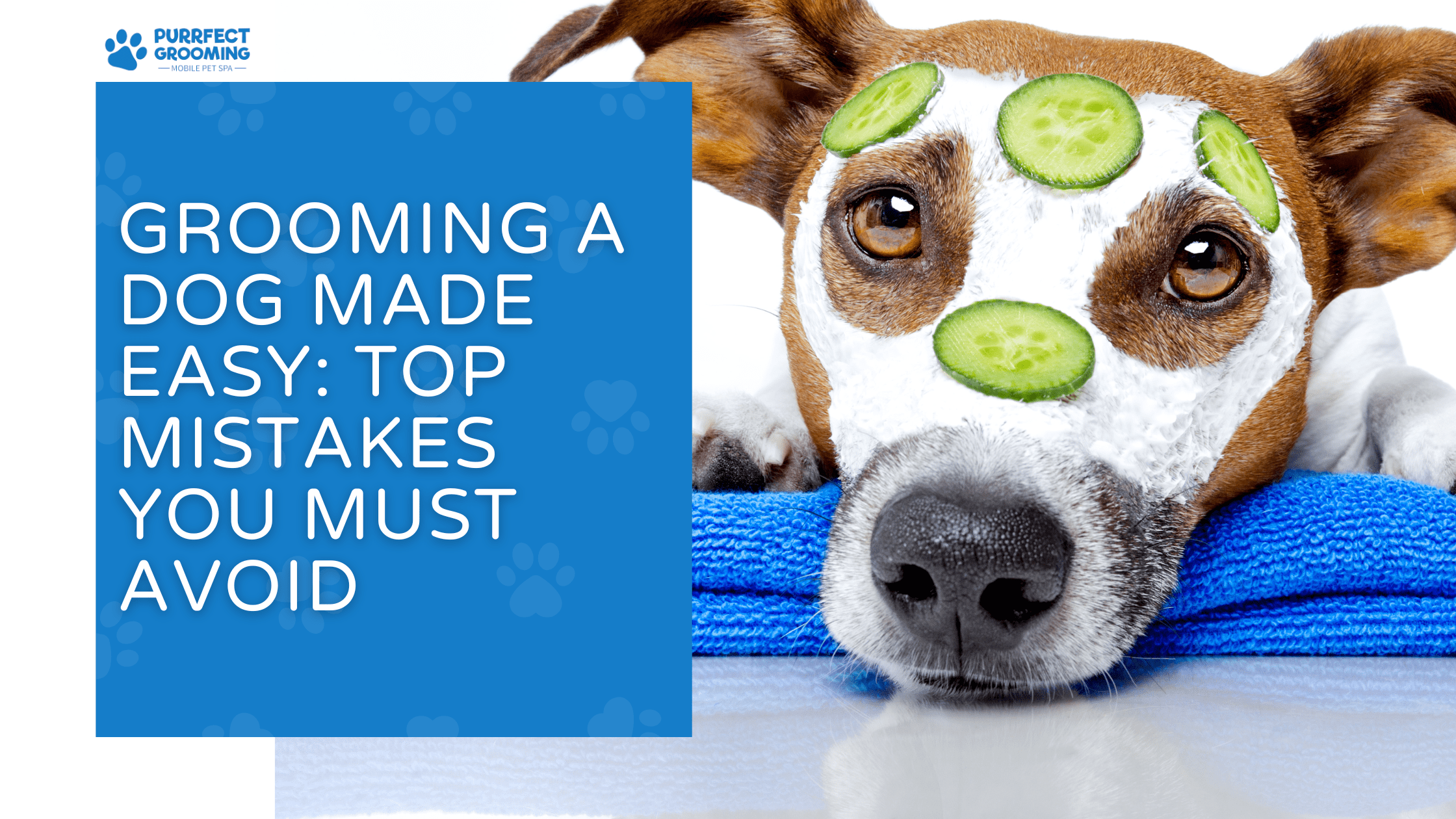Grooming a Dog Made Easy: Top Mistakes You Must Avoid
Grooming a dog at home might seem like an easy task, but many pet owners unintentionally make mistakes that can lead to discomfort, health issues, or a dreaded “dog grooming gone wrong” situation. In this guide, we’ll uncover the top 5 mistakes pet owners make while grooming a dog and provide solutions to keep your furry friend happy and healthy.Grooming a dog is essential for their overall health and happiness. However, attempting to groom a dog without proper knowledge or tools can lead to unfortunate outcomes, often referred to as “dog grooming gone wrong.” In this blog, we’ll identify the most common mistakes pet owners make while grooming a dog at home and offer practical tips to improve the process.
Using the Wrong Tools for Grooming a Dog
Selecting the right brushes and clippers: Not all dogs have the same coat type, and using tools that are unsuitable can cause discomfort or harm. For instance, a slicker brush works wonders for long-haired breeds, while a bristle brush is better for short-haired dogs.
Issues caused by improper tools: Dull clippers or low-quality brushes can lead to uneven fur, skin cuts, or matting, turning your grooming efforts into a “dog grooming gone wrong” situation.
Skipping Regular Grooming a Dog
Why a consistent schedule matters: Regular grooming prevents matting, reduces shedding, and helps identify skin issues early. Skipping sessions can lead to tangled fur, skin infections, or even pest infestations.
Long-term impact on your dog’s health: Neglecting grooming can cause discomfort and health problems, especially in breeds that require frequent maintenance, such as Poodles or Shih Tzus.
Incorrect Brushing Techniques When Grooming a Dog
Mistakes in brushing direction: Brushing against the direction of hair growth can be painful for your dog and lead to fur breakage. Always brush in the natural direction of the coat.
Over-brushing and its consequences: Excessive brushing can irritate the skin, cause bald spots, or damage the fur. Knowing when to stop is just as important as starting.
Improper Nail Trimming When Grooming a Dog
Cutting nails too short: This is a common mistake that can cause pain and bleeding. Learn to identify the “quick” in your dog’s nails to avoid injury.
Essential tools for safe nail trimming: Invest in high-quality nail clippers or grinders designed for dogs. They make the process smoother and safer.
Bathing a Dog the Wrong Way
Choosing the wrong shampoo: Using human shampoo or a harsh product not meant for dogs can disrupt their skin’s pH balance, leading to dryness and irritation.
You May Also Like : Preparing for a Dog Bath
Forgetting to protect ears during baths: Water in your dog’s ears can cause infections. Always use cotton balls or ensure the ears are shielded during bath time.
Why “Dog Grooming Gone Wrong” Happens
Stressful Grooming Experiences
Dogs can sense stress, and an uncomfortable grooming session can make them fearful of future grooming attempts. Signs of stress include whining, trembling, or resistance.
Lack of Knowledge About Grooming a Dog
Without proper training or understanding of dog grooming, even well-intentioned pet owners can make mistakes. Research and preparation are key.
Tips to Avoid Mistakes When Grooming a Dog
Preparing Your Dog for Grooming Sessions
Start by introducing grooming tools slowly. Reward your dog with treats to create positive associations with the grooming process.
Observing Signs of Stress or Discomfort
If your dog seems uneasy, take breaks. A calm dog is easier to groom and less likely to resist.
Tools for Grooming a Dog and Their Uses
| Tool | Purpose | Best For |
| Slicker Brush | Removes tangles and mats | Long-haired breeds |
| Nail Clippers | Trims nails | All breeds |
| Dog Shampoo | Cleans coat | Dogs with sensitive skin |
| Grooming Scissors | Trims specific areas | Breeds needing precision cuts |
Grooming a Dog Based on Breed
| Dog Breed | Brushing Frequency | Bathing Frequency |
| Golden Retriever | Weekly | Monthly |
| Poodle | Bi-weekly | Every 6-8 weeks |
| Labrador Retriever | Every 2 weeks | Monthly |
| Shih Tzu | 3-4 times a week | Bi-weekly |
Professional Grooming vs. DIY Grooming a Dog
When to Seek Professional Help
If your dog has severe matting, a complicated coat, or if grooming causes extreme stress, a professional groomer is the best option.
Conclusion
Grooming your dog at home can be a rewarding experience, but it requires knowledge, patience, and the right tools. By avoiding common mistakes, you can keep your dog healthy, happy, and looking great.
FAQs
1. How can I make grooming a dog easier?
Create a calm environment, introduce tools gradually, and use positive reinforcement.
2. What are the must-have tools for grooming a dog?
A slicker brush, nail clippers, dog shampoo, and grooming scissors are essential.
3. How often should I groom my dog?
Grooming frequency depends on the breed, coat type, and lifestyle, but regular sessions are recommended.
4. Can I groom my dog at home if they resist grooming?
Yes, with patience and proper training. Gradual exposure and treats can help ease their resistance.
5. What are the signs of dog grooming gone wrong?
Signs include cuts, irritated skin, bald patches, or a fearful reaction to grooming tools.
